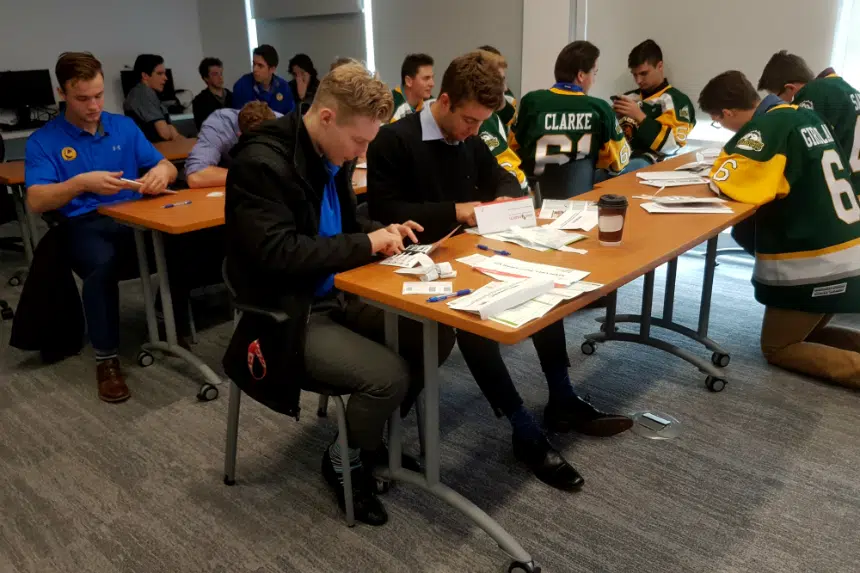A group of Saskatchewan hockey players were celebrating a cause far greater than any goal, hit or game-saving play.
The Humboldt Broncos and Saskatoon Blades stopped in at the Canadian Blood Services in Saskatoon on Saturday to learn about an initiative that hopes to spur blood donations from hockey communities across the country.
Hockey Gives Blood, a non-profit organization, was founded in the weeks following the Humboldt Broncos bus crash in April.
Co-founder Stu Middleton was inspired from his own experiences as a junior hockey player in British Columbia.
“Years ago, my dad was killed in a car accident travelling to one of my games,” Middleton said. “I was around my teammates at the time and in his death I found no difference was ever made.”
Middleton was in Disneyland when he heard of the Humboldt Broncos bus crash that killed 16 and injured 13 others on April 6. He was instantly reminded of his playing days as a teenager.
“We thought, if teams and leagues started making donating blood a part of their (off-ice) program, that could be a difference across the country,” Middleton said.
Middleton knows first-hand how hockey players in small towns across the country are looked at as leaders in their respective communities.
“If they’re leading the way, that younger generation who look up to them will follow.”
Middleton himself didn’t donate blood until a few months ago at the age of 37. He wasn’t aware of the need or asked to donate blood.
“No one told me it was important,” he said. “I never had a family member, neighbour, I never had anyone exposed to it.”
The same can’t be said for Michael Bladon. The new Humboldt Broncos forward spent his summer gearing up for his Broncos debut, but paused those preparations when his grandfather died of blood cancer.
This week he took a peak at his schedule knowing he would be at the Canadian Blood Services to hear from Middleton and Hockey Gives Blood.
After learning he was a rare and universal donor with O-negative blood type on Saturday, Bladon couldn’t turn down the opportunity to donate blood.
“If I’m a universal donor, I think that my grandpa would have wanted me to do this,” he said.
“Just knowing that if anybody needs blood, I have the ability to give it to them and I think that there’s no reason I shouldn’t.”
While players from both teams were told not to donate as they recover or prepare for a weekend game, Bladon decided to join the assistant coaches in the donor chair with his grandfather top of mind.
“We were at his house this summer and he had a thing on the wall that was sent by Canadian Blood Services that said he had 100 donations,” Bladon said. “I just think that if I could achieve the same thing, he’d be proud.”







